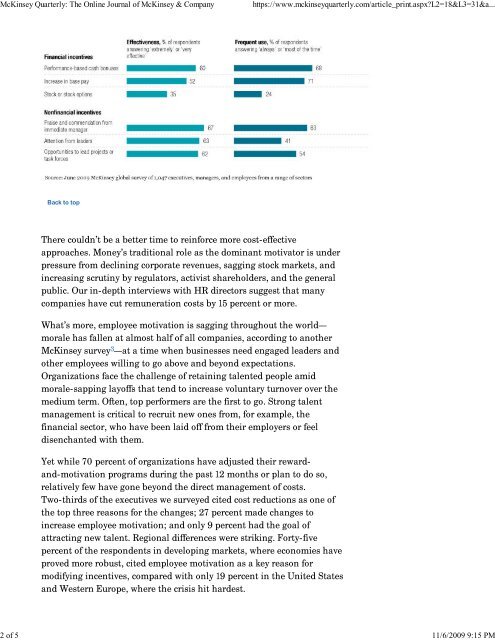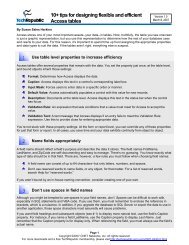McKinsey Quarterly: The Onl... - Cornerstone Business Solutions
McKinsey Quarterly: The Onl... - Cornerstone Business Solutions
McKinsey Quarterly: The Onl... - Cornerstone Business Solutions
Create successful ePaper yourself
Turn your PDF publications into a flip-book with our unique Google optimized e-Paper software.
<strong>McKinsey</strong> <strong>Quarterly</strong>: <strong>The</strong> <strong>Onl</strong>ine Journal of <strong>McKinsey</strong> & Company<br />
https://www.mckinseyquarterly.com/article_print.aspxL2=18&L3=31&a...<br />
2 of 5 11/6/2009 9:15 PM<br />
Back to top<br />
<strong>The</strong>re couldn’t be a better time to reinforce more cost-effective<br />
approaches. Money’s traditional role as the dominant motivator is under<br />
pressure from declining corporate revenues, sagging stock markets, and<br />
increasing scrutiny by regulators, activist shareholders, and the general<br />
public. Our in-depth interviews with HR directors suggest that many<br />
companies have cut remuneration costs by 15 percent or more.<br />
What’s more, employee motivation is sagging throughout the world—<br />
morale has fallen at almost half of all companies, according to another<br />
<strong>McKinsey</strong> survey 3 —at a time when businesses need engaged leaders and<br />
other employees willing to go above and beyond expectations.<br />
Organizations face the challenge of retaining talented people amid<br />
morale-sapping layoffs that tend to increase voluntary turnover over the<br />
medium term. Often, top performers are the first to go. Strong talent<br />
management is critical to recruit new ones from, for example, the<br />
financial sector, who have been laid off from their employers or feel<br />
disenchanted with them.<br />
Yet while 70 percent of organizations have adjusted their rewardand-motivation<br />
programs during the past 12 months or plan to do so,<br />
relatively few have gone beyond the direct management of costs.<br />
Two-thirds of the executives we surveyed cited cost reductions as one of<br />
the top three reasons for the changes; 27 percent made changes to<br />
increase employee motivation; and only 9 percent had the goal of<br />
attracting new talent. Regional differences were striking. Forty-five<br />
percent of the respondents in developing markets, where economies have<br />
proved more robust, cited employee motivation as a key reason for<br />
modifying incentives, compared with only 19 percent in the United States<br />
and Western Europe, where the crisis hit hardest.








